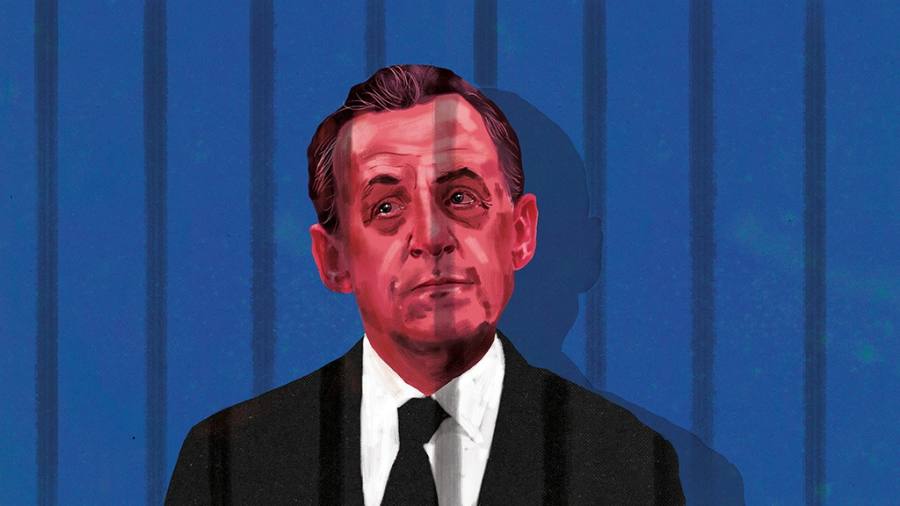[ad_1]
The writer is a professor of political science at Sciences Po university in Paris
For the first time in the history of the Fifth Republic, a former president has been sentenced to prison for corruption and influence-peddling. In what has become known as the “eavesdropping affairâ€, Nicolas Sarkozy, who maintains his innocence and plans to appeal, was accused of having promised in 2014 to help a former judge get a job in Monaco in exchange for information related to another case.
In that second case, now dropped, Sarkozy was suspected of soliciting illegal funds from Liliane Bettencourt, the L’Oréal heiress, for his successful 2007 presidential election campaign. Since leaving the Elysée Palace in 2012, Sarkozy has been mired in scandal, ranging from the financing of his presidential campaigns in 2007 and 2012, to a consultancy contract with a Russian insurance firm.
The sentencing of the former president has set off shockwaves in France. The country has some of the highest levels of political mistrust in Europe. In a survey carried out in January and February in France, Germany, Italy and the UK, French citizens were the most damning of their political class. Some 65 per cent think that elected members and leaders of political parties are “mostly corruptâ€; only 42 per cent take that view in Germany and 52 per cent in the UK. Moreover, only 16 per cent of the French trust their political parties versus 17 per cent in Italy, 32 per cent in the UK and 39 per cent in Germany.
This rejection of political representatives translates inexorably into opting out and protest. Proof of that lies in unprecedentedly low turnouts in elections and strong showings by populist parties. In all polls of voter intentions for the next presidential election in 2022, the far-right Marine Le Pen is in the lead.
Besides these detrimental consequences for the country, the consequences for the French right are far from insignificant. It is struggling to recover from the failure of François Fillon, its 2017 candidate, whose presidential campaign collapsed in an embezzlement scandal, leaving the field to two outsiders, Le Pen and Emmanuel Macron. Since then, the right has lacked a commanding figure capable of uniting it and leading it to victory.
As often happens when clear leadership is lacking, former leaders are cast in a nostalgic light. Sarkozy, who was beaten in 2012 by François Hollande, the Socialist candidate, has pushed himself in the past few years as an “imperturbable sageâ€, a moral authority, and someone who can’t be ignored because he was the last person to win the presidency for the right, in 2007. He has been consulted and pampered, and many on the right hoped he would be their candidate in 2022 — or, if not the king, then at least the kingmaker. His three-year prison sentence, with two years suspended, ends these plans and forecasts.
Sarkozy’s influence over the French right and, indirectly, the country’s future has now suddenly shrunk. The man who published the first volume of his memoirs in 2020 under the title The Time of Storms, will henceforth struggle to depict himself as someone above the storms of political life who can even quell them. Virulent denunciations of the supposed injustice of his conviction, or of alleged politicisation of the judiciary, cannot obscure that.
In the past 25 years, the rules governing how political figures act and how public life is financed have changed profoundly. They have become much stricter than they were. But political standards have not always kept pace. The judiciary, although subject to criticism, inspires far greater public trust (48 per cent), than political parties (16 per cent) or the presidency (37 per cent). In this context, Sarkozy seems to have been overtaken by a past that now threatens his present and future.
The French right is going to have do without him, emerge from its nostalgia and fashion itself using its own intellectual resources and personnel. It is a difficult task, but not impossible. Some 70 per cent of French voters surveyed by Ifop, a polling group, in February did not want the second round of the 2022 presidential elections to be between Le Pen and Macron. So there is room for a third candidate who can disrupt that oft-predicted outcome that people also say they do not want.
The French left is drained and divided at the moment. So all eyes are therefore on the moderate right, where several candidates seem to be gaining popularity — particularly Xavier Bertrand, president of the regional council of the Hauts-de-France in northern France. A clear majority of voters sympathetic to Les Républicains, the main centre-right party, see him as “a good second round candidate†for the presidential election.
To enable this swing back to the right, all that remains is to win back the rightwing voters who were lured away by Macron in 2017. The right needs to convince the public that in future it will not traffic in myths of “the great man†and “the man of the hour†— nor indulge in references to Napoleon Bonaparte, who as a figure, and a set of preoccupations, has strongly marked one of the main traditions of the French right.
The Bonapartist mould would then be left to Macron. It would also be a remarkable revamp of the French right and spell an end to rightwing leaders of the Bonapartist school.
[ad_2]
Source link





